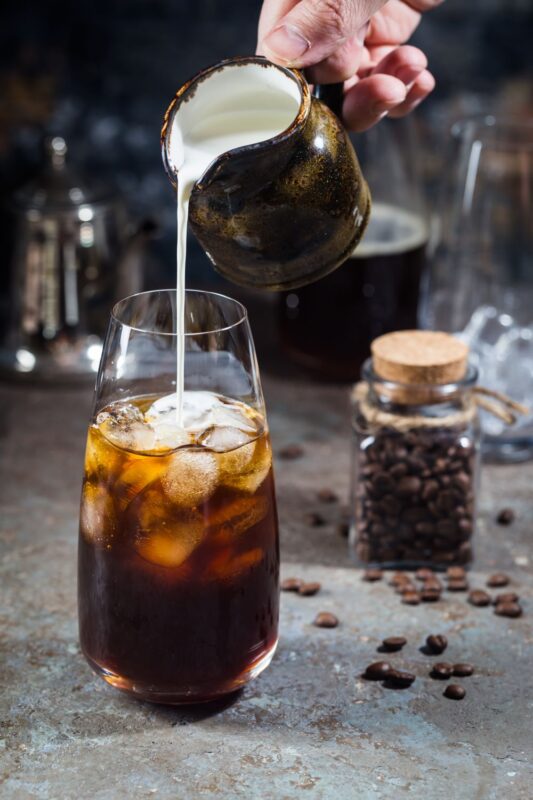Few people can envision life without coffee, but is it one of the things that you have to give up after being diagnosed with a fatty liver disease? We’re going to talk about it in today’s article and answer the question: is coffee good for fatty liver or not?
Coffee is considered good for the liver. So you can still drink coffee if you suffer from fatty liver disease (MASLD). But prepare it in a liver friendly way, without added sugar or fats to keep it healthy.
Basically, it means that if you drink your coffee with various flavors and syrups, with cream and/or other delicious, yet unhealthy foods, things will have to change a lot. I’ve already shared coffee creamer alternatives in a previous article, so we have the basics covered.
We’ll cover everything in this article, though, but first things first!
Why is coffee good for a fatty liver?

We’ll start with the good news: coffee is good for the liver, no matter if it is healthy or already affected by MASLD (aka metabolic dysfunction–associated steatotic liver disease, the new official name for fatty liver).
There are countless studies that reached the same conclusion: coffee is not doing any harm to your liver, on the contrary!
For starters, a relatively recent study published in 2016 in Barcelona, Spain showed that coffee could actually help reverse fatty liver, according to Science Daily.
However, this study was conducted on mice and used the equivalent of six shots of espresso for testing… which is a bit much if it’s a daily dose (as opposed to a one time dose).
So while the study itself is not very clear on methodology and it was only made on mice, it’s still a good start… But there is more!
Medical News Today also reports that during an event held at the Royal Society of Medicine in London, a board of experts discussed various studies reporting that coffee helps the liver.
From fatty liver to reducing the risks of cirrhosis and even cancer, coffee consumption does seem to help, according to all the studies presented.
It does appear that the more coffee you have, the better its effects on your body.

But according to WebMD, even moderate amounts will slow down Fibrosis, Cirrhosis and fatty liver in general. In other words, drinking a lot of coffee is good for the liver.
BUT there are some other important things to consider here: caffeine can increase blood pressure levels, so if you are suffering from high blood pressure, you shouldn’t drink a lot of coffee (or any – discuss matters with your doctor!).
Coffee will also prevent you from sleeping, so make sure it won’t interfere with your sleeping schedule, which is also extremely important when fighting a fatty liver.
In other words, you shouldn’t start drinking coffee only because of its benefits. It alone is not enough to help you reverse fatty liver (in my opinion), but every little bit helps.
And for most of us, knowing that we can still drink coffee even after being diagnosed with NAFLD should be considered a big win already.
It is not extremely clear at the moment what exactly makes coffee so beneficial for the liver, but it appears that not only caffeine itself helps (by creating a chemical in our body that slows the growth of the scar tissue involved in fibrosis), but also other base components of coffee, kahweol and cafestol which also help the liver.
With over 1,000 substances found in our regular coffee beans, doctors still don’t know which of them are responsible for the benefits, nor exactly how do they help the liver, but at least the conclusion is obvious.
Coffee is not only safe for your liver, but actually recommended as it helps improve the condition. Great news for those who love their daily cup of coffee!
How to drink coffee if you have a fatty liver?

Unfortunately, your favorite Starbucks Mocha Cookie Crumble Frappuccino, or your homemade coffee with your favorite coffee creamer might turn from helpful into harmful if you are suffering from a fatty liver disease.
Black coffee is the one that’s good for the liver… but if you add sugars, fats and other chemicals to bring in the flavors you enjoy, it becomes an unhealthy beverage and generally more of a dessert than actual coffee.
This means that it is very important HOW you prepare your coffee when it comes to a fatty liver.
Ideally, you should have your coffee black (without any added sweeteners or any type of milk).
However, most of us won’t be able to have it that way, and it is still safe if you add a bit of milk or a milk alternative, as well as a bit of honey or stevia.
We have already talked about alternatives for sweetening your coffee, so you have options.
Is decaf good if you have a fatty liver?

For those who can’t drink regular coffee, decaffeinated coffee becomes the only option.
But the problem here is that you also need to be extremely careful about the brand and type of decaf coffee you’re having because the decaffeinating process itself often involves washing the coffee beans with all sorts of unhealthy chemicals (read about different ways of making decaf coffee here).
However, there are some more expensive ways to remove the caffeine from the beans, and one of them is by rinsing them with water.
In other words, if you want decaf coffee and you want to keep it as safe as possible, only go for the healthiest options out there. Or you can check out an article about the best decaf coffee you can buy online.
While there aren’t as many studies on decaf coffee and its benefits for the liver, there are some that claim that at least some of them remain even after the decaffeination process.
The antioxidants and most of the other components remain even after the caffeine is removed, so most likely it is just as helpful.
Or, at the very worst, it will just do you no harm as long as you’re getting the one that is made without chemicals. So you can drink decaf coffee if you suffer from a fatty liver disease.
My personal experience: how I drank my coffee

When I was diagnosed with a fatty liver, I was overweight, extremely stressed, had very poor eating habits and a lot was going on in my life.
As a result, I also had high blood pressure at the time and the doctors had put me on beta-blockers to keep my blood pressure under control (and I was only 30, if you can imagine!)
So for almost the entire time that I needed to reverse my fatty liver (1.5 years for those who didn’t read my other articles), I drank almost exclusively decaffeinated coffee.
I personally drank a water-processed Lavazza brand – but because that was the only water-decaf I could find back then. I am sure that any other type of decaf would be just fine, as long as it is made using healthy methods.
However, after about 1 year of dieting – maybe a bit more – my blood pressure went down and normalized, so I was taken off the meds. Slowly after, I switched to drinking regular coffee again because it tastes better in my opinion.
I usually have just one large cup of homemade coffee, in the morning. I add like 1/4 of a teaspoon of honey to sweeten it as I wasn’t ever able to drink it unsweetened.
Sometimes, I add a bit of milk for the different taste. I am actually doing this more and more often now, using low fat milk and no longer adding honey. It works great.
So while I am sure that it wasn’t the coffee that helped me reverse my fatty liver, as I was following my recommended diet, exercising, sleeping more and losing a lot of weight, at the very worst it didn’t do any harm.
Conclusion
Unless you suffer from other health problems that forbit you to drink coffee (mainly the caffeine in it), coffee is not one of the things you have to give up when dieting to reverse your fatty liver.
Coffee could even help your quest to reverse your condition, so unless you have other medical conditions that prevent you from having it, just enjoy your daily cup! Even if you can only drink decaf, it’s still good.
But always consider how you drink your coffee: with minimal (ideally zero) sweeteners added to it, black or just with some low fat milk added to the mix.
And if you also enjoy drinking tea, there are even more good news for you – so make sure you read my article about green tea and fatty liver or a more generic one sharing the best types of teas for fatty liver disease.

I was diagnosed with a fatty liver back in 2014 and managed to reverse it by mid-2015. Since then, I’ve been studying it, continuously updating my knowledge with the latest scientific findings and practical approaches to give others the help they need to reverse their condition.
My approach to managing fatty liver is holistic, balancing scientifically-backed information with real-life, practical advice based on personal, direct experience.
I am also the admin of the Fatty Liver Support Group on Facebook and the Fatty Liver Subreddit.


I have been drinking coffee since my grandmother put half-coffee, half-milk in my baby bottle. It is a staple of my life. If you were to write that it was a no-no, I would still not give it up. Can have a mug of it just before bedtime with no problems whatsoever.
That said, I found this article fascinating. Thank you so much for providing this information. Never knew what the components of coffee were. This is a keeper! Now off to get my second mug of this magic brew….
Sharon
Haha, indeed! It is nice to hear that we are still allowed to have some of the things that we enjoy in an otherwise restrictive diet.
What about freeze-dried coffee? I buy an organic brand that really tastes good, not like the horrid major brands in the store… wonder if freeze dried has the same effect?